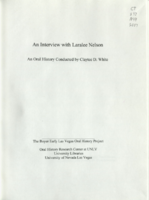Search the Special Collections and Archives Portal
Search Results

Ricardo Torres-Cortez interview, May 7, 2019: transcript
Date
Archival Collection
Description
Interviewed by Barbara Tabach. Monserrath Hernández and Maribel Estrada Calderón also participate in the questioning. Born in Mexico, came to live in Las Vegas in 1985. Graduate of UNLV in Journalism and a reporter of Public Safety for the Las Vegas Sun. Ricardo covered the 1 October shooting, the killing of two police officers and other traumatic news of the community.
Text

Maria Moore interview, August 2, 2019: transcript
Date
Archival Collection
Description
Interviewed by Elsa Lopez. Born in Belize, Director of AARP, speaks English, Spanish and Creole. Specialist in senior affairs.
Text

Transcript of interview with Marion Brooks by Kathleen Kasmir, February 24, 1975
Date
Archival Collection
Description
On February 24, 1975, Kathleen Kasmir interviewed Marion Brooks (born 1913 in Santa Ana, California) about his life in Southern Nevada and his work as a mining engineer. Brooks first talks about his background before talking extensively about his early work in mining. Brooks also mentions some of the professional mining societies of which he was a part, and the two then move on to discuss gambling, recreational activities, and the atomic testing. Other topics covered during the interview include the price of groceries and food, the El Rancho Vegas, social changes, population growth, and environmental changes. The end of the interview then shifts back to Brooks’ work in mining at Blue Diamond and then a discussion on the possible locations of three lost mines.
Text

Transcript of interview with Oliver Crickman by William Hawley, March 3, 1979
Date
Archival Collection
Description
On March 3, 1979, William Hawley interviewed Oliver Crickman (born 1933 in Apex, North Carolina) about his experiences from living in Nevada and working in restaurants. Crickman first describes his background and his first occupations prior to starting as a cook in Las Vegas restaurants. He then explains how he gradually moved from the position of cook’s helper to sous chef and his then-current position of executive chef at the Royal Inn. Crickman goes into detail about the operation of those restaurants and other Las Vegas Strip and Downtown Las Vegas properties, and he describes the demographics of cooks as well as how the hospitality industry has changed over time. The latter part of the interview involves a discussion of Crickman’s various residences in Las Vegas over time, the extent of crime, the first places to shop, and a brief discussion on mobile homes.
Text

Transcript of interview with Clark Crocker by Monica Lehman, March 3, 1978
Date
Archival Collection
Description
On March 3, 1978, Monica Lehman interviewed Clark Crocker (born 1920 in Westfield, Massachusetts) about his experiences while living in Nevada. Crocker first talks about his family and educational background before describing his experiences from going to school in both California and Massachusetts. Crocker then describes what he knows about the building of Hoover Dam and later talks about his career as a teacher and school principal. The two also discuss Crocker’s hobbies and volunteer work, including that for the fire department in Pahrump, and they later discuss Crocker’s experiences as both a frogman and navigator for the United States Navy during World War II. The interview concludes with some of Crocker’s thoughts and philosophies on how curriculum should be structured in schools.
Text

Irene Cepeda interview, April 24, 2019: transcript
Date
Description
Interviewed by Monserrath Hernández, Nathalie Martinez and Rodrigo Vázquez. Irene Cepeda is a woman dedicated to serving the Latinx as well as all minority groups in education in Southern Nevada. As a Las Vegas native, she grew up alongside the Latinx community here and is a proud Latina from Nicaraguan roots. She is dedicated to uplifting the Latinx community through her work with the Latino Youth Leadership Conference and college access specialist at Nevada State College. Now, as representative of District D on the Clark County School District Board of Trustees, she seeks to tackle the issues the district faces from acts of White supremacy to a lack of funding for English Language Learner families.
Text

Transcript of interview with Laralee Nelson by Claytee White, April 20, 2010
Date
Archival Collection
Description
Laralee Nelson and her four sisters were born and raised in Provo, Utah. She was raised in a Mormon household, her parents worked at Brigham Young University and she attended BYU She was .nearly thirty years old when she moved to Las Vegas with her husband. The move was the first real move away from her Utah home base. She fondly recalls summers at an archaeological dig in Israel while studying for her undergraduate degree. But these were nothing compared to relocating to Las Vegas. Laralee's mother was a librarian at BYU and an obvious inspiration to her career choice. Once she arrived in Las Vegas, she applied for a cataloging position at UNLV. From 1982 to 2010, it was her first and only position. From that span of years, she witnessed monumental changes in the library. Changes in leadership, a move from the old Dickinson Library to the new Lied Library, and the impact of technology. Laralee's anecdotes, especially one about the professor with the red wagon and another about her father clearing a rocky path on a family trip, reveal core success of a library built to serve the university community.
Text

Transcript of interview with Harry Kogan by Barbara Tabach, January 12, 2016
Date
Archival Collection
Description
With a liveliness of a man decades younger, Harry Kogan looks at his 100th birthday with cheer and satisfaction. Born March 11, 1916 to poor Russian immigrant parents in the Jewish ghetto of Philadelphia, Harry vividly recalls walking to school shoeless, with no hat or no raincoat. A treat would be his mother handing him ten-cents to go to the theater and enjoy a silent movie. After graduating from high school in 1933, Harry quickly took one of the rare jobs available in a garment manufacturing company where he worked his way into being a skilled and valued fabric cutter-a job that paid $35 a week. Harry was raised with two brothers and lived in Philadelphia for the first 91 years of his life before moving to Las Vegas. One of his brothers learned the refrigeration business while enlisted in the Navy and after the war formed a commercial refrigeration business named Kogan Brothers. Harry is a philosophical and philanthropic man. He was slow to retire and traveled the world, took classes and donated to his favorite causes; among which are the Boys Town Jerusalem and the Jewish Federation of Las Vegas. He sat for this interview to honor his Jewish roots, to share his life experiences and spending the past years in Las Vegas.
Text

Transcript of interview with Gary Sternberg by Barbara Tabach, February - April, 2015
Date
Archival Collection
Description
In this oral history, Gary explains how the family came to live in the United States?Cleveland and Los Angeles. In 1957, he married Noreen and they eventually came to live in Las Vegas where Gary worked for Sears selling washing machines, had a repair business and an importing business with Noreen. Gary was an entrepreneurial soul and inventive much like his father. He owns three patents.
On August 25, 1931, Augusta and Herman Sternberg welcomed their second child, Gerd (aka Gary), into the world of Cuxhaven, Germany. Augusta was a devout Christian of Polish ancestry who had fled Russian persecution. Herman was a German-born Jew salesman and inventor. The couple fell in love and had two children, Gary and Ruth who was a year and half older. By 1938, German politics were targeting Jews and Herman was ripped away from his Christian wife and children and sent to a concentration camp. Fate and friendship rescued Herman with the option to go to China. And so begins the history of the Sternberg family and how they all would eventually live together during World War II in the confines of a Jewish ghetto in Hongkew, China from May 1939 to July 1948. Gary had an extraordinary career as a dealer. He was not the stereotypical young dealer-to-be: he was in his 40s when he signed up for the Michael Gaughn Dealing School in the mid-1970s. Gary?s charming wit and ease of making friends soon gained him a position at El Cortez and then Caesars Palace. It was the same personality that would sustain his stellar thirty-one year career at Caesars. He was employed there from April 1974 until his retirement May 8, 2005. Though Jewish tradition would identify Gary as Christian, he self-identified as Jewish, officially converted and has been an active member of the Jewish community. Among his anecdotes-and he has many-is one about securing a $30,000 donation from Frank Sinatra and Jilly Rizzo for Congregation Ner Tamid.
Text

Transcript of interview with Laura Sussman and Wendy Kraft by Barbara Tabach, February 17, 2016
Date
Archival Collection
Description
They've been referred to as the two Jewish mothers who own a funeral home. At first glance that seems too simple a description. However, it is how they arrived at this description that tells a story of two women who moved here in the late 1990s and whose paths crossed as they became part of the Jewish community of Las Vegas. Laura Sussman arrived first. It was 1997. The Jewish Community Center, a JCC without walls as Laura puts it, hired her as its first executive director. She was from Ohio where there was a robust Jewish tradition. She was director for eight years; then executive director at Temple Beth Sholom. Wendy Kraft moved to the valley in 1999. She was a stay at home mom from Boston, who was accustom to volunteering in the Jewish community. Knowing no one and on the brink of divorce, the Jewish community became her life, a way to build a network of friends and keep her occupied just as it had been in Boston. The two women met through their work with the JCC and love followed. Several years later, in 2009, so did their new business, Kraft-Sussman Funeral and Cremation services. By February 6, 2015, Laura and Wendy had married. They had already formed a family with each other and their three daughters, Leah Sussman, Emma and Elyse Kraft. In this interview they discuss their joint sense of purpose that includes love of family, dedication to the Jewish community, pride in the LGBT identity, and providing caring services to those at the time of funeral services. They talk also of Jewish traditions related to death, the Jewish burial society known as Chevra Kadisha, and challenges of their industry. They share feelings about nonprofits and how they value being actively involved in the community.
Text
